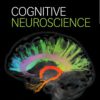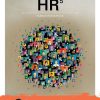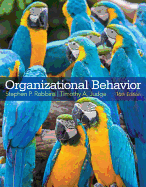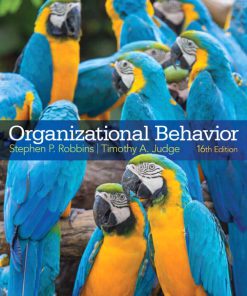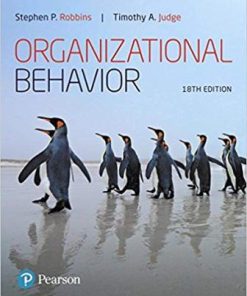Test Bank for Organizational Behavior, 16/E 16th Edition Stephen P. Robbins, Timothy A. Judge
$35.00 Original price was: $35.00.$26.50Current price is: $26.50.
Test Bank for Organizational Behavior, 16/E 16th Edition Stephen P. Robbins, Timothy A. Judge
Test Bank for Organizational Behavior, 16/E 16th Edition Stephen P. Robbins, Timothy A. Judge digital download immediately after payment is complete.
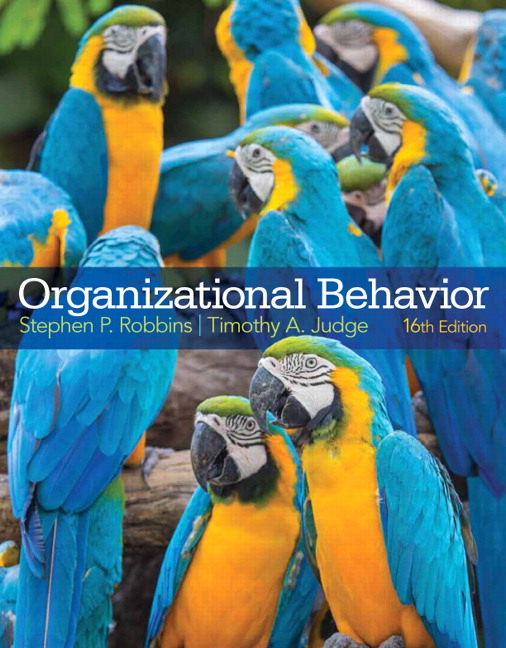
Product details:
- ISBN-10 : 0133507645
- ISBN-13 : 978-0133507645
- Author:
Long considered the standard for all organizational behavior textbooks, Organizational Behavior provides the research you want, in the language your students understand. This text continues its tradition of making current, relevant research come alive for students.
The Sixteenth Edition has been thoroughly updated to reflect the most current recent research for Organizational Behavior, while maintaining its hallmark features –clear writing style, cutting-edge content, and engaging pedagogy. There’s a reason why Robbins textbooks have educated millions of students and have been translated into twenty languages—and it’s because of a commitment that provides the kind of engaging, cutting-edge material that helps students understand and connect with Organizational Behavior.
Table contents:
1 Introduction
1 What Is Organizational Behavior?
Self-Assessment Library How Much Do I Know About Organizational Behavior?
The Importance of Interpersonal Skills
What Managers Do
Management Functions
Management Roles
Management Skills
Effective versus Successful Managerial Activities
A Review of the Manager’s Job
Enter Organizational Behavior
Complementing Intuition with Systematic Study
Myth or Science? “Management by Walking Around Is the Most Effective Management”
Big Data
Disciplines That Contribute to the OB Field
Psychology
Social Psychology
Sociology
Anthropology
There Are Few Absolutes in OB
Challenges and Opportunities for OB
Responding to Economic Pressures
Responding to Globalization
Managing Workforce Diversity
Improving Customer Service
Improving People Skills
Working in Networked Organizations
Enhancing Employee Well-Being at Work
Creating a Positive Work Environment
Improving Ethical Behavior
An Ethical Choice Vacation Deficit Disorder
Coming Attractions: Developing an OB Model
An Overview
Inputs
Processes
Outcomes
glOBalization! Suicide by Economic Crisis
Summary
Implications for Managers
Point/Counterpoint Lost in Translation?
Questions for Review
Experiential Exercise Intoxicated Workplaces
Ethical Dilemma Jekyll and Hyde
Case Incident 1 Apple Goes Global
Case Incident 2 Era of the Disposable Worker?
2 The Individual
2 Diversity in Organizations
Self-Assessment Library What’s My Attitude Toward Older People?
Diversity
Demographic Characteristics of the U.S. Workforce
Levels of Diversity
Discrimination
An Ethical Choice Affirmative Action for Unemployed Veterans
Biographical Characteristics
Myth or Science? Bald Is Better
Age
Sex
glOBalization! Worldwide Talent Search for Women
Race and Ethnicity
Disability
Other Biographical Characteristics :Tenure, Religion, Sexual Orientation and Gender Identity, and Cultural Identity
Ability
Intellectual Abilities
Physical Abilities
The Role of Disabilities
Implementing Diversity Management Strategies
Attracting, Selecting, Developing, and Retaining Diverse Employees
Diversity in Groups
Effective Diversity Programs
Summary
Implications for Managers
Point/Counterpoint Affirmative Action Should Be Abolished
Questions for Review
Experiential Exercise Feeling Excluded
Ethical Dilemma Board Quotas
Case Incident 1 Levitating IQs
Case Incident 2 The Treasure Trove of the Aging Workforce
3 Attitudes and Job Satisfaction
Self-Assessment Library How Satisfied Am I with My Job?
Attitudes
What Are the Main Components of Attitudes?
Does Behavior Always Follow from Attitudes?
An Ethical Choice Are Employers Responsible for Workplace Incivilities?
What Are the Major Job Attitudes?
glOBalization! Exodus Phenomenon
Self-Assessment Library Am I Engaged?
Job Satisfaction
Measuring Job Satisfaction
How Satisfied Are People in Their Jobs?
What Causes Job Satisfaction?
The Impact of Satisfied and Dissatisfied Employees on the Workplace
Myth or Science? “Happy Workers Means Happy Profits”
Summary
Implications for Managers
Point/Counterpoint Employer–Employee Loyalty Is an Outdated Concept
Questions for Review
Experiential Exercise What Factors Are Most Important to Your Job Satisfaction?
Ethical Dilemma Bounty Hunters
Case Incident 1 The Pursuit of Happiness: Flexibility
Case Incident 2 Job Crafting
4 Emotions and Moods
Self-Assessment Library How Are You Feeling Right Now?
What Are Emotions and Moods?
The Basic Emotions
Myth or Science? “Smile, and the Work World Smiles with You”
The Basic Moods: Positive and Negative Affect
Function of Emotions
Sources of Emotions and Moods
Self-Assessment Library What’s My Affect Intensity?
Emotional Labor
Affective Events Theory
Emotional Intelligence
The Case for EI
The Case Against EI
An Ethical Choice Should Managers Use Emotional Intelligence (EI) Tests?
Emotion Regulation
Self-Assessment Library What’s My Emotional Intelligence Score?
OB Applications of Emotions and Moods
Selection
Decision Making
Creativity
Motivation
Leadership
Negotiation
Customer Service
Job Attitudes
Deviant Workplace Behaviors
Safety and Injury at Work
How Managers Can Influence Moods
glOBalization! Creating Highly Productive Teams Across the Cultural Emotional Barrie
Summary
Implications for Managers
Point/Counterpoint Sometimes Blowing Your Top Is a Good Thing
Questions for Review
Experiential Exercise Who Can Catch a Liar?
Ethical Dilemma Happiness Coaches for Employees
Case Incident 1 Is It Okay to Cry at Work?
Case Incident 2 Can You Read Emotions from Faces?
5 Personality and Values
Self-Assessment Library Am I a Narcissist?
Personality
What Is Personality?
The Myers-Briggs Type Indicator
The Big Five Personality Model
The Dark Triad
Approach–Avoidance
Other Personality Traits Relevant to OB
Myth or Science? “We Can Accurately Judge Individuals’ Personalities a Few Seconds After Meeting Them”
Personality and Situations
glOBalization! Is the Personality Profile of an Entrepreneur the Same Across the United States, the United Kingdom, and Germany?
Values
The Importance and Organization of Values
Generational Values
An Ethical Choice Do You Have a Cheating Personality?
Linking an Individual’s Personality and Values to the Workplace
Person–Job Fit
Person–Organization Fit
International Values
Summary
Implications for Managers
Point/Counterpoint Millennials Are More Narcissistic
Questions for Review
Experiential Exercise What Organizational Culture Do You Prefer?
Ethical Dilemma Personal Values and Ethics in the Workplace
Case Incident 1 On the Costs of Being Nice
Case Incident 2 Personal Space
6 Perception and Individual Decision Making
Self-Assessment Library What Are My Gender Role Perceptions?
What Is Perception?
Factors That Influence Perception
Person Perception: Making Judgments About Others
Attribution Theory
Common Shortcuts in Judging Others
Specific Applications of Shortcuts in Organizations
Myth or Science? “All Stereotypes Are Negative”
The Link Between Perception and Individual Decision Making
Decision Making in Organizations
The Rational Model, Bounded Rationality, and Intuition
Common Biases and Errors in Decision Making
Self-Assessment Library Am I a Deliberate Decision Maker?
Influences on Decision Making: Individual Differences and Organizational Constraints
Individual Differences
glOBalization! Does Multicultural Experience Make for Better Decisions?
Organizational Constraints
What About Ethics in Decision Making?
Three Ethical Decision Criteria
Creativity, Creative Decision Making, and Innovation in Organizations
An Ethical Choice Choosing to Lie
Creative Behavior
Causes of Creative Behavior
Creative Outcomes (Innovation)
Self-Assessment Library How Creative Am I?
Summary
Implications for Managers
Point/Counterpoint Stereotypes Are Dying
Questions for Review
Experiential Exercise Biases in Decision Making
Ethical Dilemma Deciding to Cheat
Case Incident 1 Decision-Making Processes at Steel Inc.
Case Incident 2 Career Promotion at Emox: Rationalizing Under Uncertainty
7 Motivation Concepts
Self-Assessment Library How Confident Am I in My Abilities to Succeed?
Defining Motivation
Early Theories of Motivation
Hierarchy of Needs Theory
Theory X and Theory Y
Two-Factor Theory
McClelland’s Theory of Needs
Contemporary Theories of Motivation
Self-Determination Theory
Job Engagement
glOBalization! Autonomy Needs Around the Globe
Myth or Science? “Helping Others and Being a Good Citizen Is Good for Your Career”
Goal-Setting Theory
Self-Assessment Library What Are My Course Performance Goals?
Self-Efficacy Theory
Reinforcement Theory
An Ethical Choice Motivated by Big Brot
Equity Theory/Organizational Justice
Expectancy Theory
Integrating Contemporary Theories of Motivation
Summary
Implications for Managers
Point/Counterpoint Goals Get You to Where You Want to Be
Questions for Review
Experiential Exercise Organizational Justice Task
Ethical Dilemma Grade Inflation
Case Incident 1 Equity and Executive Pay
Case Incident 2 Sleeping on the Job
8 Motivation: From Concepts to Applications
Self-Assessment Library What’s My Job’s Motivating Potential?
Motivating by Job Design: The Job Characteristics Model
The Job Characteristics Model
How Can Jobs Be Redesigned?
Myth or Science? “Money Can’t Buy Happiness”
Relational Job Design
Alternative Work Arrangements
The Social and Physical Context of Work
Employee Involvement
Examples of Employee Involvement Programs
Linking Employee Involvement Programs and Motivation Theories
Using Rewards to Motivate Employees
What to Pay: Establishing a Pay Structure
How to Pay: Rewarding Individual Employees Through Variable-Pay Programs
An Ethical Choice Sweatshops and Worker Safety
Flexible Benefits: Developing a Benefits Package
Intrinsic Rewards: Employee Recognition Programs
glOBalization! Outcry Over Executive Pay Is Heard Everywhere
Summary
Implications for Managers
Point/Counterpoint “Face-Time” Matters
Questions for Review
Experiential Exercise Applying the Job Characteristics Model
Ethical Dilemma Inmates for Hire
Case Incident 1 Motivation for Leisure
Case Incident 2 Attaching the Carrot to the Stick
3 The Group
9 Foundations of Group Behavior
Self-Assessment Library Do I Have a Negative Attitude Toward Working in Groups?
Defining and Classifying Groups
Why Do People Form Groups?
Stages of Group Development
The Five-Stage Model
An Alternative Model for Temporary Groups with Deadlines
Group Properties: Roles, Norms, Status, Size, Cohesiveness, and Diversity
Group Property 1: Roles
Myth or Science? “U.S. Workers Are More Biased Than Asians”
Self-Assessment Library Do I Trust Others?
Group Property 2: Norms
An Ethical Choice Using Peer Pressure as an Influence Tactic
Group Property 3: Status
Group Property 4: Size
Group Property 5: Cohesiveness
glOBalization! Making Global Virtual Teams Effective
Group Property 6: Diversity
Group Decision Making
Groups versus the Individual
Groupthink and Groupshift
Group Decision-Making Techniques
Summary
Implications for Managers
Point/Counterpoint People Are More Creative when They Work Alone
Questions for Review
Experiential Exercise Surviving the Wild: Join a Group or Go It Alone?
Ethical Dilemma It’s Obvious; They’re Chinese
Case Incident 1 The Calamities of Consensus
Case Incident 2 Investing in the Herd
10 Understanding Work Teams
Self-Assessment Library How Good Am I at Building and Leading a Team?
Why Have Teams Become So Popular?
Differences Between Groups and Tea
Types of Teams
Problem-Solving Teams
Self-Managed Work Teams
Cross-Functional Teams
Virtual Teams
Multiteam Systems
An Ethical Choice Virtual Teams Leave a Smaller Carbon Footprint
Creating Effective Teams
Context: What Factors Determine Whether Teams Are Successful?
glOBalization! Developing Team Members’ Trust Across Cultures
Team Composition
Myth or Science? “Team Members Who Are ‘Hot’ Should Make the Play”
Team Processes
Self-Assessment Library What Is My Team Efficacy?
Turning Individuals into Team Players
Selecting: Hiring Team Players
Training: Creating Team Players
Rewarding: Providing Incentivesto Be a Good Team Player
Beware! Teams Aren’t Always the Answer
Summary
People also search:
organizational behavior 16th edition
textbook organizational behavior 16th edition
overview of organizational behavior
what is organizational behavior (ob)
3 levels of organizational behaviour
You may also like…
Solution Manual
Solution Manual for Organizational Behavior, 15th Edition Stephen P. Robbins Timothy A. Judge
Solution Manual
Solution Manual for Organizational Behavior, 16/E 16th Edition Stephen P. Robbins, Timothy A. Judge
Solution Manual
Organizational Behavior Robbins 15th Edition Solutions Manual
Solution Manual
Solution Manual for Organizational Behavior, 18th Edition, Stephen P. Robbins, Timothy A. Judge


